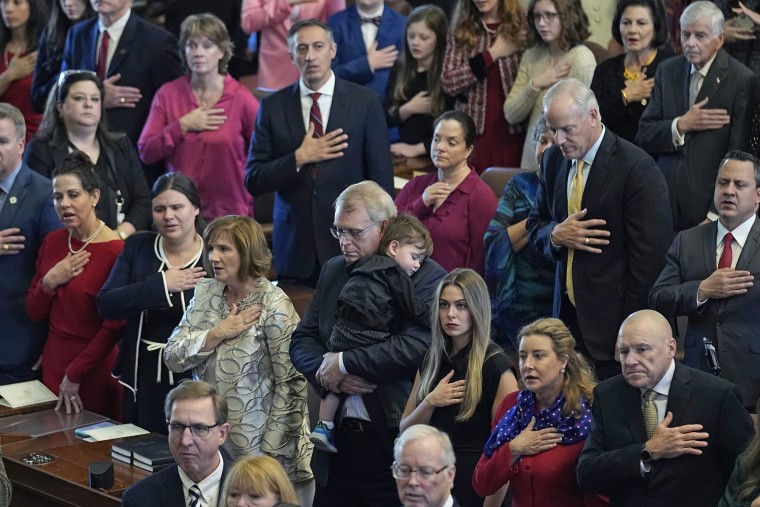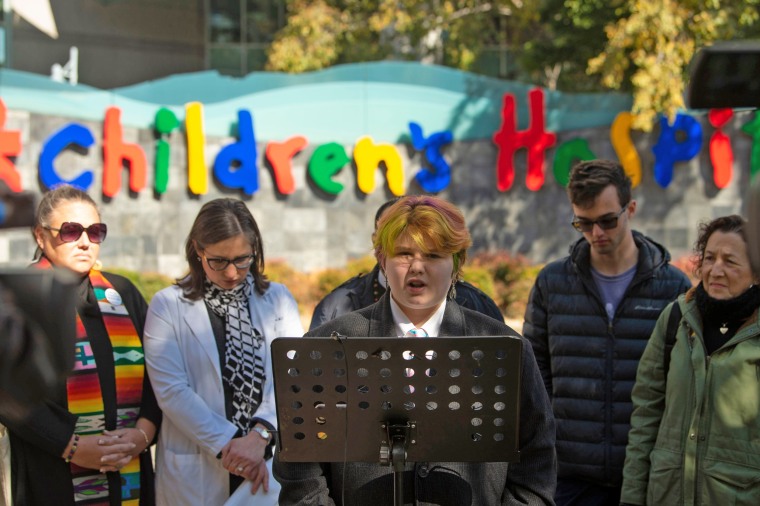[ad_1]
More than 100 bills targeting LGBTQ rights and queer life — from transgender health care to drag shows — have been filed in 22 states for 2023 so far, leading advocates to expect this year will set a new record for anti-LGBTQ legislation.
So far, Texas has taken the lead with 36 such bills, according to Equality Texas, a statewide LGBTQ advocacy group. Missouri is next with 26, then North Dakota with eight and Oklahoma with six.
The majority of these approximately 120 bills focus on transgender young people, continuing a trend that began about two years ago.
In the past three years, 18 states have banned transgender student athletes from competing on school sports teams that align with their gender identity rather than the sex they were assigned at birth, according to the Movement Advancement Project, an LGBTQ think tank. Four states — Arkansas, Alabama, Tennessee and Arizona — have enacted restrictions on gender-affirming medical care for minors, though federal judges have blocked them from taking effect in Arkansas and Alabama.

This year lawmakers in at least three states have introduced bills to restrict transgender girls and women from playing on female sports teams, and lawmakers in at least 11 states have proposed bills that would restrict gender-affirming health care for minors.
For the third year in a row, efforts to restrict LGBTQ rights and queer life have been escalating, according to Chase Strangio, the deputy director of the American Civil Liberty Union’s LGBT and HIV Project. Strangio, one of the attorneys who is representing transgender young people and their parents in their lawsuit against Arkansas’ prohibition on gender-affirming medical care, said he expected the number of anti-LGBTQ bills filed this year to outpace those filed last year, when more than 340 such bills made it to state legislatures, according to an estimate from the Human Rights Campaign.
He said he’s most worried about more states restricting access to gender-affirming care and, if the makeup of Congress becomes more conservative in 2024, a potential federal ban.
“The rightward shift in state legislatures is really scary,” he said. “We’re seeing continued erosion and efforts to restrain and constrict and limit bodily autonomy across the board. … There’s just a lot that I think people are taking for granted, particularly people who live in states like New York and California and aren’t paying attention to what’s going on in states like Arkansas, Oklahoma and Texas.”

One bill transgender advocates are particularly worried about is an Oklahoma proposal that would bar transition-related care not only for minors but for anyone under the age of 26; it would also prohibit Medicaid from covering such care.
State Sen. David Bullard, the Republican sponsoring the bill, told The Oklahoman that gender-affirming medical care is a “permanent change in your body that cannot be reversed.
“At the age of 21 you can drink, but at the end of the day if you decide to put the alcohol down, you can put the alcohol down,” Bullard told The Oklahoman. “But with this surgery, there is no going back. We just want to make sure that the brain is fully developed before we allow this kind of surgery, permanent thing to happen.”
Bullard did not immediately return a request for comment.
Accredited medical associations — including the American Medical Association, the American Academy of Pediatrics and the American Psychological Association — have supported gender-affirming care for minors.
Advocates and doctors who treat trans youth have said many of the health care restrictions proposed by state legislators mischaracterize what gender-affirming care is. The World Professional Association for Transgender Health, a nonprofit professional and educational organization dedicated to transgender health, doesn’t recommend medical intervention at all before puberty.
Before puberty, trans young people might socially transition, meaning they might change their name, pronouns and clothing. For some transgender youths, going through puberty in the sex they were assigned at birth can have a negative effect on their mental health, so WPATH recommends puberty-blocking medications in the early stage of puberty (Tanner stage 2), which temporarily pauses puberty, or hormone therapy at the same stage, but only if they meet a list of criteria. Gender-affirming surgery for minors, even post puberty, is rare.
A new slate of bills targeting drag performers has also emerged, likely in response to increasing protests in the past year against children attending drag brunches or Drag Story Hour, a national program started in 2015 in which drag performers read books to children at libraries, schools and bookstores
Bills filed in Arizona, Arkansas, Montana, Tennessee, Texas and West Virginia would ban minors from attending drag performances and seek to classify any business that hosts such performances as a cabaret or a “sexually oriented business.”
Tennessee state Sen. Jack Johnson — a Republican who filed a bill that would make it a misdemeanor for “male or female impersonators who provide entertainment that appeals to a prurient interest” to perform on public property or in front of minors — told WSMV-TV, an NBC affiliate in Nashville, that he had received complaints about drag shows from constituents.
Molly Gormley, Johnson’s press secretary, said the bill is “aimed at protecting children from being exposed to sexually explicit drag shows or other performances inappropriate for children.”
“It is similar to laws that prohibit children from going to a strip club or that prohibit public nudity,” Gormley said in an email. “This is a common-sense measure and is not anti-drag or anti-transgender. It is about protecting children.”
Jace Wilder, the education manager at the Tennessee Equality Project, described the climate for LGBTQ people in the state as “vicious.”
Over the past two years, the state has passed both a law that bars trans student athletes from playing on school sports teams that match their gender identity, and a law that prohibits gender-affirming medical care for children before puberty, even though medical intervention is not recommended for pre-pubertal youths.
Johnson’s bill, which is one of the four LGBTQ-related bills proposed in Tennessee for the current legislative session, would classify drag performances as adult cabaret.
A similar bill in Arizona would require businesses that host drag performers to be zoned as adult performance venues. It defines a drag performer as “a person who dresses in clothing and uses makeup and other physical markers opposite of the person’s gender at birth to exaggerate gender signifiers and roles and engages in singing, dancing or a monologue or skit in order to entertain an audience.”
Wilder said that the language in many of these bills, including those proposed in Arizona and Tennessee, is so broad that it doesn’t just include drag performers but also “attacks anyone that is gender-nonconforming or gender diverse.”
The bills feel like they’re “backtracking” to decades old cross-dressing laws, Wilder said, where “you could walk across the street and someone defined that as a sexual presence and could have you arrested for ‘impersonating another gender.’”
“Our biggest worry is, honestly, how are we going to come out of this safe?” he said.
Legislation in Florida has already made people there feel unsafe, according to Brandon Wolf, press secretary for Equality Florida, a statewide LGBTQ advocacy group. He specifically cited the Parental Rights in Education law (dubbed the “Don’t Say Gay” bill by critics), which prohibits classroom instruction on “sexual orientation or gender identity … in kindergarten through grade 3 or in a manner that is not age appropriate or developmentally appropriate for students in accordance with state standards.”
“We have over 9,000 teacher vacancies in Florida driven in part because of the character assassination they’ve been under over the last couple of years,” Wolf said. “Young people are telling us they’re really afraid. … They’re afraid that school isn’t safe for them anymore, and their families are wondering if they’re going to have to leave Florida to be able to raise their children in a state that respects them and treats them with dignity.”
Rachel Hill, the government affairs director of Equality Texas, said lawmakers in her state have pre-filed 36 anti-LGBTQ bills so far — more than were proposed during the entire legislative session in 2021.
Two years ago, Texas considered more than 50 bills that target trans people during its regular legislative session and three special sessions, and all but one — a trans athlete ban — failed to become law.
While the state didn’t have a legislative session last year (the Texas Legislature meets only every other year), Texas Attorney General Ken Paxton and Gov. Greg Abbott directed the state’s child protective services agency to investigate any claims of parents providing gender-affirming care to their minor children as child abuse. Some of those investigations have been blocked because of two lawsuits, but the threat of investigation has led many families with trans kids to leave the state.
But those who have chosen to stay are “fired up,” Hill said, echoing similar sentiments from advocates in other states.
“If anything, what we’re feeling is defiant,” she said. “While we are facing probably the toughest legislative session we’ve ever faced in Texas, we are ready to meet it.”
[ad_2]
Source link


